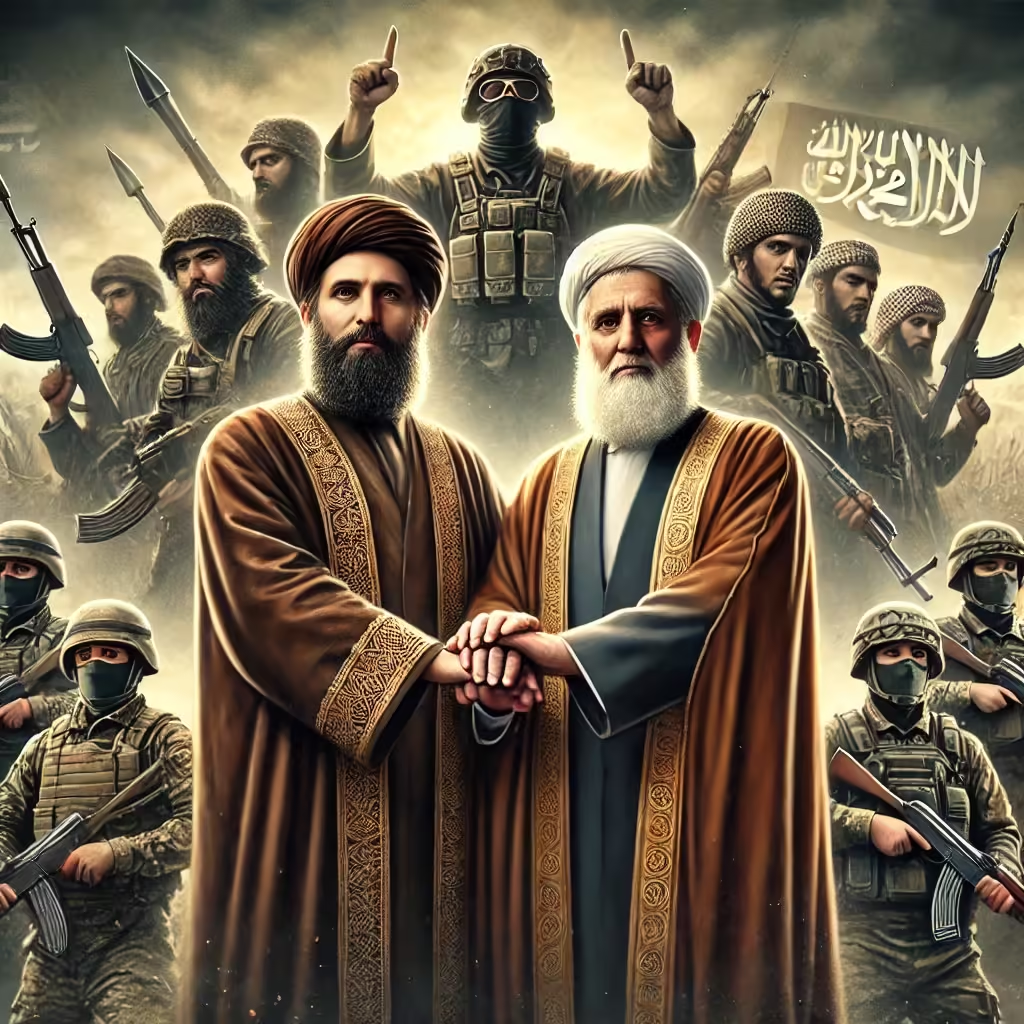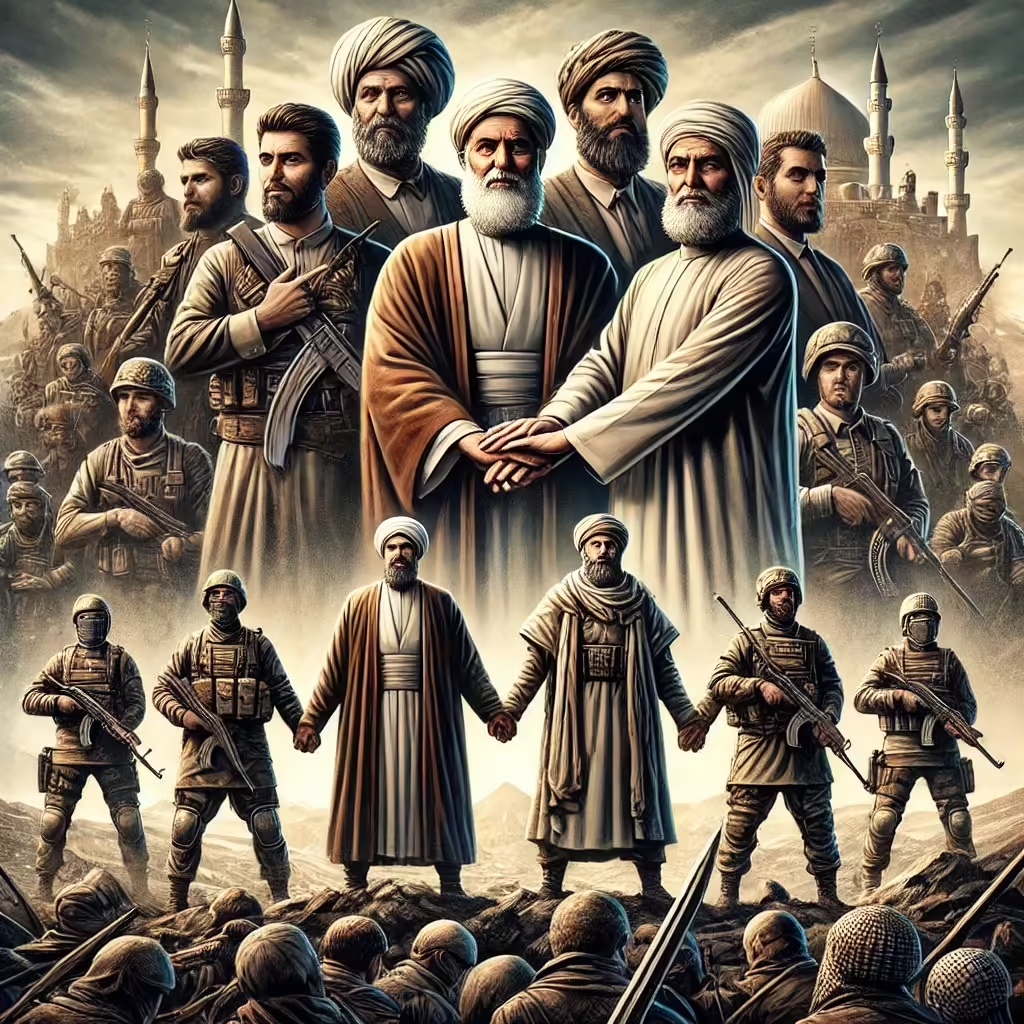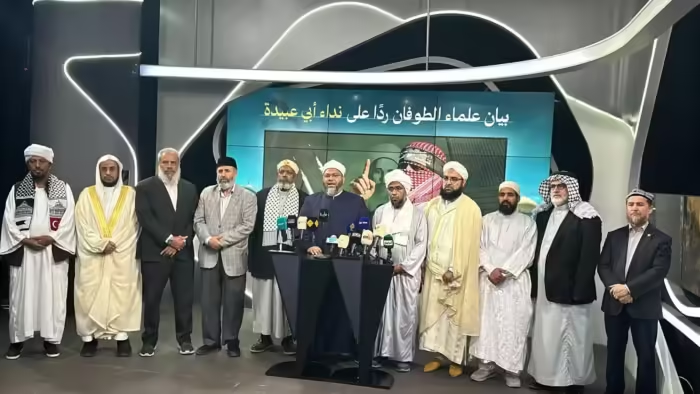Table of Contents
Introduction
In the name of ALLAH, the Strong, the True, and the Glorious. May peace and blessings be upon our Prophet Muhammad, the truthful and trustworthy, and upon His family, companions, and those who follow and support Him until the Day of Judgment.
The Islamic scholars have heard the call directed to them by the brave fighter Abu Ubaidah, the spokesperson for the Mujahideen in Gaza, may ALLAH protect and support him and all his brothers.
The Divine Mandate
Before Abu Obeida’s call, the Islamic scholars have long been aware of ALLAH’s words:
“[ALLAH praises] those who convey the messages of ALLAH and fear HIM and do not fear anyone but ALLAH“1
(Surah ‘Al-‘Ahzaab, 33:39)
They also remember ALLAH’s covenant:
“…You must make it clear [i.e., explain it] to the people and not conceal it…”2
(Surah ‘Ali-‘Imraan, 3:187)
and HIS stern warning against those who hide the truth, as stated in the verse:
“Indeed, those who conceal what WE sent down of clear proofs and guidance after WE made it clear for the people in the Scripture – those are cursed by ALLAH and cursed by those who curse“3
(Surah ‘Al-‘Baqarah, 2:159)
The Al-Aqsa Flood Operation: A Defining Moment
The Al-Aqsa Flood operation has revealed a distinction between the scholars of the Muslim community and those aligned with authorities. It has shown who has sacrificed worldly gains for the hereafter, and who has traded their afterlife for the sake of others’ worldly interests. ALLAH has used this event to separate truth from falsehood, and ongoing challenges will continue to do so, dividing people into two clear camps: one of pure truth, and one of hypocrisy without any truth.
Islamic Scholars’ Stance on the Al-Aqsa Flood Operation
Islamic scholars have supported this blessed flood with clear fatwas and honorable stances issued by respected imams and leaders. However, as events unfold and the conflict widens, and the occupation’s endeavor to expand the area of war, these efforts are no longer enough. The youth and specialists must work to overcome the barriers preventing these fatwas from reaching the public, breaking through the media blockade that hinders the advocates of truth from being heard.
The Sanctity of Al-Aqsa and Palestine
The flood began in Gaza to protect the blessed Al-Aqsa Mosque. It is a foremost duty for the Muslim community to defend, liberate, and cleanse it from the defilement of the criminal Zionists who seek to destroy it and build their claimed temple in its place. This religious obligation leaves no justification before ALLAH for anyone who fails to contribute or neglects those fighting in its defense.
Key Points from the Islamic Scholars’ Statement
In response to the call of the Mujahideen, we affirm a number of constants and call on all those affiliated with the people of knowledge to fulfill more of the duty of explanation, more of the duty of action, and to strive by all means to take leadership of the nation and direct its compass:
1. All of Palestine, from the sea to the river, belongs to the entire Muslim community, and no one has the authority to give up or concede any part of it. The blessed Al-Aqsa Mosque, in its entirety—above and below—is the rightful and exclusive possession of Muslims, and no one else has any claim to it.
2. When Islamic land is attacked and its defense exceeds the local population’s capacity, Jihad becomes an individual obligation for both the people of that land and the nearby Muslims until they are able to overcome the occopier.

This is particularly emphasized for Palestinian in the occupied territories, followed by those in neighboring countries. The responsibility concerning Palestine has now expanded to encompass all Muslims. Jihad in Palestine is a defensive Jihad, and it becomes an individual obligation where it is clear that achieving sufficiency requires the involvement of the entire Muslim community. The duty extends to both leaders and citizens, groups and individuals, and the greater one’s capacity to contribute and influence, the stronger and more urgent this obligation becomes.
3. Contemporary Jihad takes many forms, offering Muslims various ways to fulfill their religious duty. Everyone must understand their role in this effort. These forms include: armed Jihad, expanding it wherever the enemy advances, and preempting the enemy in areas where they seek to expand. This follows ALLAH’S command:
“And fight against the disbelievers collectively as they fight against you collectively. And know that ALLAH is with the righteous [who fear HIM]“4
(Surah ‘At-Tawbah, 9:36)
Other forms include: supporting the Mujahideen with money, weapons, and resources; caring the families of fighters, martyrs, prisoners, and the needy; organizing protests and sit-ins at embassies of countries supporting the occupation; engaging in media efforts and online campaigns to counter Zionist narratives; using social media to promote truth and combat falsehood; economic boycott, exposing those dealing with Zionists and Americans, and disrupting their interests; cyber Jihad targeting the occupier’s sites and infrastracture.
A key form of Jihad is focusing on education and raising a generation prepared for victory, emphasizing the importance of the liberation project that began on October 7, with the pinnacle of effort being Jihad in all its forms. Especially for the youth, it is essential to develop strategies and mechanisms within their reach.
4. The leaders of Arab and Islamic countries must mobilize and deploy their armies to repel Zionist aggression and liberate the holy sites. If they do not, their minimum duty is to support their Muslim brothers in Palestine by all available means.
They must also oppose the Zionist presence in Palestine, starting with cutting political ties, ending trade agreements, and canceling the humiliating normalization treaties made against the will and interests of the Muslim community. Despite these treaties, the enemy has shown no respect for them, continuing aggression against lives, religion, sanctities, and property.
Rulers must use their countries’ resources to stop the ongoing genocide of civilians and the defenseless, which has persisted for a year. Failing to do so would mean neglecting a clear religious duty, possibly falling into actions that nullify their faith and undermine the core principles of Islam.
5. All normalization agreements with the Zionist enemy are religiously prohibited and fundamentally void. They hold no binding authority over Muslims in any way, and it is impermissible to accept or rely on any security derived from them.
6. Muslims are not required to listen to or obey any authority or ruler that hinders them from supporting their fellow Muslim fighters in any way. Instead, they must resist such situations and strive with all their efforts, as there is no obedience to a created being when it involves disobedience to the Creator.
7. Any regime that provide the Zionist enemy with money, food, military or security aid, political backing, media support, or any form of assistance has committed a serious betrayal. Those who do so with the intent of strengthening them against Muslims have aligned themselves with the disbelievers.
8. Islamic scholars commend and bless all support for the resistance and any action that strengthens their Jihad and weakens their enemies. They urge every capable individual to contribute, focusing on the central issue of liberating Jerusalem and its surroundings, supporting the Mujahideen, and participating in every form of Jihad.

9. Islamic scholars affirm their commitment to supporting the Al-Aqsa Flood operation by providing everything necessary through explaining the legitimacy of Jihad, expanding its jurisprudence, and spreading relevant fatwas. They emphasize the duty to strive for the liberation of the land and the rescue of prisoners, while addressing doubts raised by hypocrites and detractors. Scholars also urge Muslims to support their brothers in the Holy Land and to lead in this effort, as knowledge holds no value if it does not drive its bearer to the level of support befitting scholars and the significance of this cause.
A Call to Remember the Imprisoned
In conclusion, we must remember the imprisoned scholars, preachers, and reformers held by oppressors. These individuals are paying the price for speaking the truth with their lives, time, and souls. They are living proof that the nation of Muhammad, Peace be upon Him, still has those who stand for ALLAH with conviction.
We ask ALLAH Almighty to grant victory to HIS Mujahideen everywhere and to guide this nation to the path of righteousness.
Signatories of the Statement
First – Organizations and Institutions
- Palestinian Scholars Association (PSA)
- International Organization to support the Prophet of Islam ﷺ
- Eritrean Ulamaa League
- One Nation Foundation
- Forum of Scholars
- Palestinian Preachers Forum
- Sunna Scholars Association
- Al-Maali Association for Science and Education in Algeria
- Global Committee for the Support of Palestine
- Council of Preachers in Lebanon
- Dar Al-Quran and Al-Hadith, USA
- Union of Scholars and Sharia Schools in Turkey
- Islamic Fiqh Academy in India
- Union of Scholars and Islamic Schools in Turkey
- Iraqi Coalition for the Support of Al-Aqsa
- Maghreb Scholars Association
Second – Individuals
- Grand Mufti of Libya, Sheikh Sadiq Al-Ghariani
- Sheikh Mohamad El Hassan Ould Al-Dadow
- Dr. Nawaf Takarri
- Dr. Muhammad Assagheer
- Dr. Hassan Kettani
- Dr. AbdHay Yousif
- Dr. Hussein Abdul Aal
- Sheikh Ahmed Al-Hasan Al-Shanqeeti
- Dr. Wasfy Ashour Abu Zayd
- Dr. Salman Al-Saudi
- Dr. Saied ibn Nasser Al-Ghamdi, Secretary General of the Forum of Scholars
- Prof. Ramadan Khamees, Professor of Quranic Interpretation at Al-Azhar University
- Dr. Marwan Abu Ras, Head of the Jerusalem Committee at the Union of Muslim Scholars
- Dr. Saad Razika
- Sheikh Radwan Nafi’ Al-Rahali
- Dr. Khalwati Sahrawi, Head of Ascend Academy for Scientific and Preaching Training in Algeria
- Dr. Mahmoud Said Al-Shujrawi, Jerusalem Committee at the Palestinian Scholars Association
- Sheikh Dr. Nasseem Yassin, President of the Palestinian Scholars Association
- Dr. Munir Juma
- Dr. Omar Al-Shibli, University of Zitouna
- Sheikh Mokhles Barzaq
- Dr. Zainab Al-Sheikh Al-Rabbani, Scholars Training Center, Mauritania
- Dr. Jasser Auda
- Dr. Tariq Rashid, Palestinian Preachers Forum, Lebanon
- Dr. Saeed Al-Shibli, Islamic Thinker
- Sheikh Ali Al-Youssef
- Dr. Ibrahim Mehana
- Dr. Osama Abu Bakr
- Prof. Gamal Abdul Satar
- Sheikh Muhammad Khair Ramadan Yusuf
- Dr. Suleiman Al-Ahmar Al-Ansari
- Sheikh Burhan Saeed, President of the Eritrean Scholars Association
- Sheikh Hassan Salman
- Sheikh Ahmed Al-Banjweeni
- Sheikh Muhammad Salem Doudou
- Sheikh Abdullah bin Tahir Ba Omar
- Mullah Anwar Al-Farqini, Union of Scholars and Islamic Schools in Turkey
- Sheikh Abdul Majeed Al-Balushi, Al-Murtada Foundation for Islamic Studies and Preaching
- Sheikh Sameh Jebbah
- Sheikh Saad Yassin
- Dr. Abu Bakr Al-Essawi, Iraqi Coalition for the Support of Al-Aqsa
- Sheikh Ruslan Al-Masri
- Prof. Abdullah Jaballah, Senior Scholar, Algeria
- Faraj Ahmed Kindi, Board Member, Libyan Scholars Association
- Dr. Mustafa Dhulfiqar – President of the Institute of Comparative Studies, Tehran
- Dr. Fahmi Islam Jiwanto
- Dr. Omar bin Abdulaziz Al-Qurashi
- Dr. Magdy Shalash
- Hatem Abdel Azim
- Sheikh Sami Al-Saadi
- Sheikh Abdulhakim Atwi – Lebanon
- Mr. Muhammad Omar – Vice President of the Union of Turkestan Scholars
- Prof. Dr. Abdul Jabbar Saeed
- Sheikh Mukhtar Al-Arabi Moamen
- Mr. Haroon Khatibi – Afghanistan
- Sheikh Fahmi Salem Zubair – Indonesia
- Sheikh Muhammad Mahfouz Al-Walid Abu Hafs
- Sheikh Imam Abdullah Ameen – Mauritania
- Sheikh Ahmed Mazid bin Muhammad Abdul Haq Al-Bouni
- Dr. Abdulrahman Muhammad Aref – Kurdistan, Iraq
- Preacher Engineer Fadel Soliman
Sources:
- Dr. Mohamed Assagheer. X Post.


Assalamo Alaikum, we need this in printable zine format to disseminate Insha-Allah.
Wa Alaykum Salam, Insha-ALLAH :))